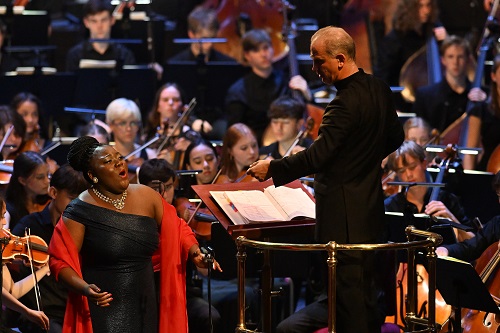Copland, Hindemith and Strauss are not obvious bedfellows. However, the focus on the 1940s from either side of the Atlantic made perfect sense for this annual Prom appearance of the National Youth Orchestra of Great Britain, on this occasion under Carlos Miguel Prieto, making his Proms debut. Big, lavishly scored orchestral works are ideal for the super-sized forces of this stage filling group which fielded some 160 plus young musicians – I’m sure Uncle Tom Cobley was there somewhere too – though the 90 string players had to work hard to balance the weight of brass and woodwind. Even so, the discipline and energy of the players was thrilling.
First off was Hindemith’s seldom performed and cumbersomely titled Symphonic Metamorphosis on Themes by Carl Maria von Weber (1943), first given in Britain by the BBC Symphony Orchestra under Constant Lambert at a 1946 Prom. The NYO responded to Hindemith’s good humour with evident relish underlining the first movement’s irrepressible joie de vivre. Balance was not always advantageous (brass too blousy and woodwind occasionally piercing), but the sheer élan swept aside those considerations as well as the polite demeanour of Weber’s original piano duet Alla zingara. Then there was Hindemith’s riotous take on Weber’s incidental music to Gozzi’s Turandot – an engaging orchestral workout displaying each department, briefly reminiscent of Britten’s Young Person’s Guide to the Orchestra, and no less virtuosic in its colouring or use of fugue, the latter launched by roistering trombones. The movement’s trills, jazzy syncopations and unbuttoned manner were all conspicuously articulated, with timpani and percussion players wonderfully alert in their varied contributions. Woodwind brought much distinction and wistfulness to the ‘Andantino’, while the closing ‘Marsch’ enjoyed plenty of pageantry if not quite the necessary swagger, Prieto sensing a controlled approach might be the safest bet. Nonetheless, a bravura performance.
The mood and pace shifted down a notch for Strauss’s Four Last Songs (1948), first performed at the Royal Albert Hall in 1950. Here, the NYO became accommodating collaborators for South African soprano Masabane Cecilia Rangwanasha who made her debut at the Proms last year in Verdi’s Requiem. If Strauss’s valedictory songs are indelibly associated with Elizabeth Schwarzkopf, Jessye Norman and Lisa della Casa (my favourite), there was much to admire in these poised accounts where every textural nuance was vividly projected. Aside from the suppleness and easy beauty of her voice, the most striking aspect was how well Rangwanasha never had to force her sound over the players. ‘Frühling’ was bountiful in its warmth of expression, its soaring contours radiantly delivered if a little thin at the top of her voice. Words were savoured in ‘September’ – ‘Akazienbaum’ (acacia tree) intensely felt and its dreaming perfectly captured at the close by the most glorious horn solo. Emotions deepened in ‘Beim Schlafengehen’, its liberating spirit tenderly summoned by orchestral leader Isabell Karlsson before Rangwanasha soared heavenwards to ravish the ear with an iridescent glow. ‘Im Abendrot’ began promisingly enough, but she wallowed in its farewell turning it into a stretch limo thereby denying any natural momentum.

After such indulgence the encore was an arrangement of He’s Got the Whole World in His Hands (courtesy of Errollyn Wallen) which provided the orchestra with an opportunity to show off their vocal cords. And jolly impressive they were too as the players formed a backing choir of close harmonies to Rangwanasha, now clearly in her element, the audience in the palm of her hands.
The Russian-born conductor Serge Koussevitzky considered Aaron Copland’s Third Symphony (1946) ‘the greatest American symphony ever written’. Whether one agrees with this assertion is another matter and there are enough detractors to disregard the claim, finding within the work contemporary elements of Soviet Realism. The symphony was one of fifteen works commissioned by the Koussevitsky Music Foundation that included Benjamin Britten’s Peter Grimes, Koussevitzky stumping up $1000. But it’s not the Suffolk coast that’s conjured in Copland’s heroic symphonism; rather, America’s wide-open spaces, as well as an optimism that carries the ‘language of hope’, as described by the New York Times. It’s a work that shows off the prowess of the NYO brass, notably so in the ‘Fanfare for the Common Man’ embedded into the Finale. There is also that elusive string writing and spiky woodwind passages within the ‘Andantino’, all beautifully polished and atmospheric from these players. Brash at times, occasionally over-enthusiastic in a ‘Wagons West’ sort of way, this characterful performance captured its triumphalism, and, above all, illustrated the talent of these remarkable musicians.
The packed audience went away with a spring in its collective step following a second encore – Benny Goodman’s exhilarating Sing, Sing, Sing – improvisatory talent now added to already considerable musicianship. Essential listening on BBC Sounds if you missed it.
David Truslove
Hindemith – Symphonic Metamorphosis on Themes by Carl Maria von Weber; Strauss – Four Last Songs; Copland – Symphony No.3
Masabane Cecilia Rangwanasha (soprano), National Youth Orchestra of Great Britain, Carlos Miguel Prieto (conductor)
Royal Albert Hall, South Kensington, London; Saturday 5th August 2023.
ABOVE: Masabane Cecilia Rangwanasha with The National Youth Orchestra conducted by Carlos Miguel Prieto (c) BBC / Mark Allan